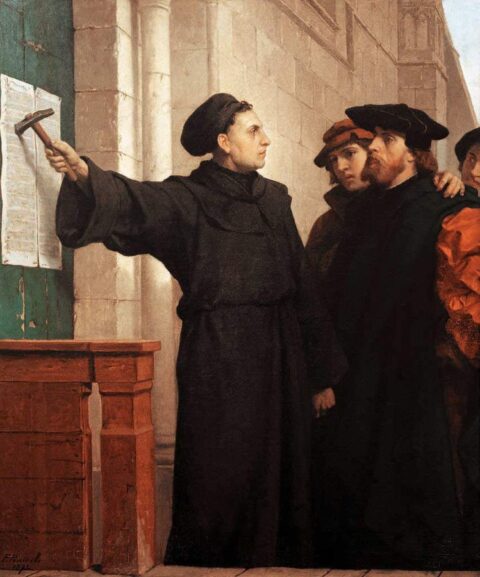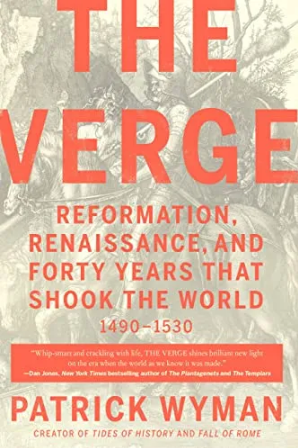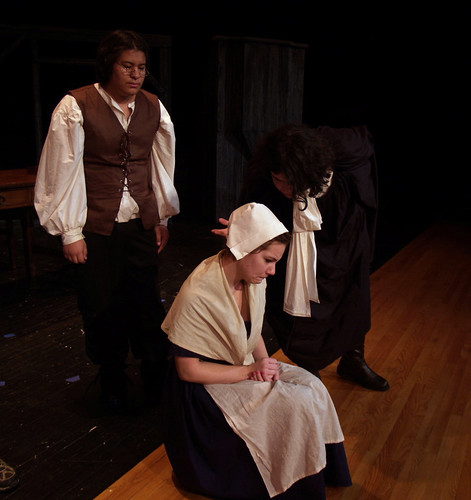The Reformation’s great complaint against the late-medieval Church is that it, the Church, had turned Catholicism entirely into a process. Those naive folks who argue that life wasn’t so hard for the medieval peasant because he had all those days off — 180 some odd saints’ days, feast days, and so on — have a bit of a point for all that. Ritual life simply was community life; “free time” as we understand it just wasn’t a thing in the middle ages, and not just because life was such a constant struggle. Every hour of your day carried its obligation to someone; there’s a reason the very best sources for “daily life in the middle ages” are called books of hours.
Your hotter Protestants, your John Calvins and Oliver Cromwells and so on, saw all of this as mere ritual. And to be fair to them, late-medieval Catholicism was very elaborate, and very, very weird — slog through a few chapters of The Stripping of the Altars if you want the details. To the Prods, this was cheating — you can’t just go through the motions and expect to get into Heaven. They made a similar distinction between “natural magic” and the unlawful stuff — the one was undertaken only after deep study and the most rigorous self-purification, while the other “worked” entirely mechanically, because what the sorcerer was really doing was cheating; he was really making a deal with a (or The) devil, to short-circuit the natural processes.
Now, it’s important to realize that the Protestants were not saying anything close to “do your own thing, man”. They were NOT hippies, encouraging everyone to read the Bible and decide for themselves how best to commune with the Big JC. The German peasants thought that’s what Martin Luther was saying back in 1524, but Luther himself was out there urging the authorities to smash the peasants with extreme prejudice. The Protestants were, in fact, extremely concerned about ritual. It just had to be the right ritual, the Biblically sanctioned ritual, and nothing but that — that’s what “Puritanism” (originally an insult) means.
Severian, “Faith vs. Works”, Rotten Chestnuts, 2021-09-07.
November 19, 2024
QotD: The Reformation
August 20, 2024
November 22, 2023
Another look at the “Great Divergence”
The latest book review from Mr. and Mrs. Psmith’s Bookshelf features Patrick Wyman’s The Verge: Reformation, Renaissance, and Forty Years that Shook the World:
This is a weird Substack featuring an eclectic selection of books, but one of our recurring interests is the Great Divergence: why and how did the otherwise perfectly normal people living in the northwestern corner of Eurasia managed to become overwhelmingly wealthier and more powerful than any other group in human history? We’ve covered a few theories about what’s behind it — not marrying your cousins, coal, the analytic mindset (twice) — but there are lots of others we’ve never touched, including geographic and thus political fragmentation, proximity to the New World, and even the Black Death. So this is also a book about the Great Divergence, but unlike many of the others it doesn’t offer One Weird Trick to explain things. Instead, Wyman approaches the period between 1490 and 1530 through nine people, each of whom exemplifies one of the many shifts in European society, and so paints a portrait of a changing world.
Of course, he does point to a common thread woven through many of the changes: culture. Or, more specifically, the institutions1 surrounding money and credit that Europeans had spent the last few hundred years developing. But these weren’t themselves dispositive: after all, lots of people in lots of place at lots of times have been able to mobilize capital, and most of them don’t produce graphs that look like this. Really, the secret ingredient was — as Harold Macmillan said of the greatest challenge to his government — “events, dear boy, events”.2 Europe between 1490 to 1530 saw an unusually large number of innovations and opportunities for large-scale, capital-intensive undertakings, and already had the economic institutions in place to take advantage of them. One disruption fed on the next in a mutually-reinforcing process of social, political, religious, economic, and technological change that (Wyman argues) set Europe on the path towards global dominance.
Some of Wyman’s characters — Columbus, Martin Luther, Holy Roman Emperor Charles V — are intensely familiar, but he presents them with verve, as interested in giving you a feel for the individual and their world as in conveying biographical detail. (This is an underrated goal in the writing of history, but really invaluable; the “Cross Section: View from …” chapters were always my favorite part of Jacques Barzun’s idiosyncratic doorstopper From Dawn to Decadence.) This is particularly welcome when it comes to the chapters featuring some lesser-known figures: you may have heard of Jakob Fugger, but unless you’re a Wimsey-level fan of incunabula you’re probably unfamiliar with Aldus Manutius. One-handed man-at-arms Götz von Berlichingen becomes our lens for the chapter about the Military Revolution not because he played a particularly significant role but because he wrote a memoir, and small-time English wool merchant John Heritage is notable pretty much solely because his account book happened to survive into the present. But even with the stories “everyone knows”, Wyman takes several large steps back in order to contextualize that common knowledge: for example, were you aware that while before 1492 Columbus didn’t take any particularly unusual voyages, he did take an unparalleled number and variety of them, making him one of the best-travelled Atlantic sailors of his day? Did you know that Isabella’s inheritance of the Castilian throne was far from certain?3
As the book continues, Wyman can reference the cultural and technological shifts he described in earlier chapters. For instance, much of the Fuggers’ wealth came in the form of silver from deep new mines in the Tyrol. Building the mines required substantial capital — for their new, deeper tunnels and the expensive pumps to drain them, as well as for the furnaces and workshops to separate the copper from the silver via the relatively inefficient liquation process — and while everyone knew all along that the metals were there, it took the combination of a continent-wide bullion shortage and a rising demand for copper to cast bronze cannon (look back to the chapters on state formation and the military!) to make it worth anyone’s while to get them out. But it wasn’t only the Fuggers who made their money in these new mines: the money for Martin Luther’s education came from his father’s small-scale copper mining concern in eastern Germany. Grammar school in his hometown, a parish school nearby, and then four years at university cost Luther pater enough that he couldn’t follow it up for his younger sons (and from his point of view the was probably squandered when Martin became a monk instead of the intended lawyer who would be an asset in the frequent mining disputes), but such an education for even one son would have been out of reach if not for the printed texts on grammar, philosophy and law that made it all far more affordable.
Of course, the relationship between Luther and printing goes both ways. While Luther’s very existence as an educated man was enabled by the printing press, it was the intellectual and religious ferment he would kick off that made printing work.
1. Wyman glosses the term as “a shared understanding of the rules of a particular game … the systems, beliefs, norms and organizations that drive people to behave in particular way”, but it’s more or less what I’ve elsewhere called bundles of social technologies.
2. Apparently he may not have said this, but he should have so print the legend.
3. Isabella’s opponent, her half-niece Joanna, was married to King Afonso V of Portugal, so perhaps some degree of Iberian unification might still have followed. On the other hand, Afonso already had an adult son (King João II, widely admired as “the Perfect Prince” — Isabella always referred to him simply as el Hombre, “the Man”) who would have had no personal claim to Castile. Joanna and Afonso’s marriage was annulled on the perfectly true grounds of consanguinity — he was her uncle — after they lost the war, so they never had children, but if she had won perhaps João (who died without legitimate issue) could have been succeeded by a much younger half-Castilian half-brother. Certainly an Isabella relegated to Queen-Consort of Aragon would still have been a force to be reckoned with, but losing the knock-on effects of her reign (Columbus, Granada, the fate of the Sephardim, not to mention the eventual unification of most of Europe under Ferdinand and Isabella’s Habsburg grandson) makes all this a pretty good setup for an alternate history!
Even more fun: before she married Ferdinand of Aragon, there was discussion of Isabella’s betrothal to Richard, Duke of Gloucester. Yeah, that one.
October 28, 2023
QotD: Deposing King Charles I
It’s 1642, and once again the English are contemplating deposing a king for incompetence. Alas, the Reformation forces the rebels to confront the issue the deposers of Edward II and Richard II could duck: Divine sanction. The Lords Appellant could very strongly imply that Richard II had lost “the mandate of heaven” (to import an exoteric term for clarity), but they didn’t have to say it – indeed, culturally they couldn’t say it. The Parliamentarians had the opposite problem – not only could they say it, they had to, since the linchpin of Charles I’s incompetence was, in their eyes, his cack-handed efforts to “reform” religious practice in his kingdoms.
But on the other hand, if they win the ensuing civil war, that must mean that God’s anointed is … Oliver Cromwell, which is a notion none of them, least of all Oliver Cromwell, was prepared to accept. Moreover, that would make the civil war an explicitly religious war, and as the endemic violence of the last century had so clearly shown, there’s simply no way to win a religious war (recall that the ructions leading up to the English Civil War overlapped with the last, nastiest phase of the Thirty Years’ War, and that everyone had a gripe against Charles for getting involved, or not, in the fight for the One True Faith on the Continent).
The solution the English rebels came up with, you’ll recall, was to execute Charles I for treason. Against the country he was king of.
Severian, “Inertia and Incompetence”, Founding Questions, 2020-12-25.
October 4, 2023
QotD: The Witchburning and the “Mandate of Heaven”
Turning to more familiar Western examples, look at Germany, especially in contrast to England. Germany was on the forefront of every big social and economic change in the late Middle Ages, but you couldn’t blame their rulers for not handling it, because they didn’t have any. The minor princely states, the Electors of the Holy Roman Emperor, the Emperor himself, the Hanseatic League, and what have you — what could any of them do in the face of plagues and economic dislocations and terminal papal corruption and the massive intellectual upheaval of the printing press, even if their authority extended more than a few miles in any given direction, which it didn’t?
So they burned witches. The “European Witch Craze” of the 15th century has been a feminist bugbear for a long time, and one must naturally assume that pretty much all modern scholarship on it is uber-politicized hooey1, but it’s clear that there really were a lot of witch burnings in Germany in the 1400s. All that free-floating anxiety has to land somewhere, and since it’s pointless to blame the Margrave — he of the one decrepit castle and three square miles of territory — “witches” are a prime target. See also “the Period of the Wars of Religion” — is it any surprise that the most famous witchcraft stuff came from Germany just before the Reformation, or France in the depths of the religious wars, or England around the Civil War?
Clearly something is wrong with the universe – the Mandate of Heaven has been lost, not by any individual ruler necessarily, but by society. “Purity spirals” are also characteristic of these periods, and they quickly spiral out of control — see e.g. the Anabaptist Commune at Munster, or of course the Puritans.
Speaking of, the most famous-to-Americans example is the Salem Trials, and here we see all the trends converge. Not that the Puritans of Plymouth Bay would be so hubristic as to claim the Mantle of Heaven for themselves — Puritans were nothing if not ostentatiously self-effacing — but claim it they did, in deed if not in word, since Plymouth Bay was the closest thing one will ever get to a theocracy this side of Calvin’s Geneva (they burned their “witches”, too). And they just as clearly lost the Mandate — economic dislocations, a devastating Indian war brought about largely by their own hubristic incompetence, even a plague.
The aftermath of all this is fascinating. COVID, of course, is our new witch panic, and feel free to prognosticate on our current situation based on the life of Cotton Mather. The colony’s hottest young intellectual superstar in 1693, he went all-in on “spectral evidence” and the like, and by 1700 he was a joke on both sides of the Atlantic. So, too, with “critical race theory” and all the rest. There’s a racial awakening happening, kameraden, no doubt about that, but it has nothing to do with the eggheads’ fantasies. Those are just witch panics, and while witch panics are devastating to those caught in them, the wheel always turns sooner than later …
Severian, “Witch Trial Syndrome”, Rotten Chestnuts, 2021-01-27.
1. Which was also true of earlier scholarship, most famously Miss Murray’s The Witch-Cult in Western Europe, which is Marxist economics-level disproven, but still fervently believed by “Wiccans” everywhere.
March 10, 2023
Having solved all other problems, Congress now investigates … (checks notes) … the Protestant Reformation
Chris Bray respectfully outlines some of the questions the honourable Congressmen Congresspersons Congressentities Representatives would be likely to pose to the witnesses:

Martin Luther nails his 95 theses to the door of All Saints Church in Wittenberg, 1517.
Painting by Ferdinand Pauwels (1830-1904) via Wikimedia Commons.
1.) Mr. Luther, you — sorry, having trouble with my reading glasses. It says here you … mailed 95 feces to a door? Do you feel that it was appropriate to put something like that in the mail?
2.) Mr. Calvin, sir, you have raised numerous objections to the elevation of the host. Shouldn’t you be equally concerned about the elevation of the hostess? Don’t you feel that gendered terms are problematic?
3.) For all the witnesses, I’m told you wish to choose your own pastures. Isn’t that a question best left to the farmers?
4.) Gentlemen, you apparently propose to dissolve the monasteries. But most of them are, in my understanding, made out of big rocks, with very solid walls. Wouldn’t that take a prohibitive amount of acid to dissolve those? Have you done an EIR?
5.) I must very candidly inform the witnesses that I cannot agree to your premise, and I frankly find it absurd to say that faith alone is the cause of salivation. Do you have credentials in the science of digestion?
February 25, 2022
QotD: The lure of the forbidden knowledge
When we as academics avoid those uncomfortable questions, we unwittingly invite others to answer them for us. When activists try to suppress rather than debate speech they find loathsome, they should know they are adding to its mystique.
Forbidden ideas have an appeal that orthodoxy never does — just ask Martin Luther. In fact, the parallels between the rise of the alt-right and the Reformation are interesting. In Luther’s world the printing press had recently created new and difficult to control ways for people to share subversive ideas. Early forms of capitalism led to the rise of new social classes and fueled resentment against traditional elites and traditional forms of authority. There were even early forms of the meme. Long before Pepe the Frog was co-opted by the alt-right, drawing donkey ears on images of priests was a way of provoking the powerful.
It’s surely the case that some of the speech that activists and university administrators seek to suppress poses a much more direct threat to real people than does a debate about supply side economics or evolution, but it’s worth remembering that to the Church, the Lutheran heresy was a real threat too. It posed a mortal danger to the eternal souls of people who were deceived by its falsehoods and rejected orthodoxy. I doubt that the Inquisitors felt any more qualms about deplatforming Lutheran heretics than did the activists at Middlebury.
As the Church learned, simply suppressing heresy cannot guarantee that it will go away. If anything, meeting heretical speech with violence or disruption just adds to its allure, confirming in the minds of the already convinced that they are right and leading the fence sitters to take another, perhaps more sympathetic, look. Dismissing heretical speech because it falls into a category that is rejected by the orthodox is not that much more effective a strategy.
We can do a lot to keep things from getting to the sort of highly contentious encounters like the ones at Middlebury and Berkeley, just by addressing uncomfortable issues with evidence rather than just categorization in our courses. Next time you are tempted to sidestep contentious issues in your class or to dismiss a student’s question because it falls into a forbidden category, don’t.
In the long run we can’t win an argument by avoiding it.
Erik Gilbert, “Liberal Orthodoxy and the New Heresy”, Quillette, 2019-02-04.
May 3, 2021
History Summarized: Pope Fights 2 — The Reformation
Overly Sarcastic Productions
Published 26 Apr 2019Thank you to our Patron Peter Bemis for commissioning this video! To support the channel, head over to Patreon.com/OSP
You’ve seen the Double-Pope matchup, but what about the Double-Christianity face-off? Today’s Pope Fights covers the history and aftermath of the Protestant Reformation and Catholic Counter-Reformation.
FURTHER READING, from shortest to longest books:
The Reformation: A Very Short Introduction — https://www.amazon.com/Reformation-Ve…
Christianity In The West (1400-1700) — https://www.amazon.com/gp/product/019…
The Reformation: A History — https://www.amazon.com/The-Reformatio…DISCORD: https://discord.gg/ZufVWse — Come one come all to the official OSP discord server!
MERCH LINKS:
Shirts – https://OverlySarcasticProducts.Threa…
All the other stuff – http://www.Cafepress.com/OverlySarcas…OUR WEBSITE: https://www.OverlySarcasticProductions.com
Find us on Twitter @OSPYouTube!
October 3, 2019
The Puritans, then and now
Severian thinks on churchiness and churchianity in our times:
The most striking fact about the Middle Ages from a modern perspective is their love of lists, categories, forms. This is partly practical — Church art all looks the same because it has to communicate a consistent message to the aforesaid illiterate peasantry — but lots of it isn’t. They were simply obsessed with forms, with outward order, to the point that even the few true individuals were hard to tell apart — William of Ockham and Thomas Aquinas were as different as two thinkers could possibly be, but unless you’re a subject matter expert, their writings look identical.
“The Crucible” by Len Radin is licensed under CC BY-NC-SA 2.0
“Individuality,” on the other hand, comes from inward experience. What, if anything, did the medieval peasant believe when he went to Mass? Impossible to say, but one of the reasons that’s so is because the form of his “piety” was so all-encompassing. Some years back, a Jew wrote a funny book about trying to live his life by the letter of the Mosaic law. One could do the same thing with medieval Catholicism. Take a gander at the liturgical year — hardly a day goes by without a feast, a commemoration, a celebration. Do all of that, and you’ll hardly have time for anything else. They were so focused on the outward show, at least in part, because there was so much showing to do.
When the Reformation shitcanned all that, piety turned inward. There are zillions of sources for what the Reformed believed (or, at least, said they believed), because the Reformation was a middle-class pursuit and the middle classes were literate … and, crucially, had the free time to be literate. I’m guessing here, but since people are people and always have been, I’m pretty sure that your medieval peasant loved the show of his religion, because it gave him a little much-needed time off from his hourly grind of back-breaking, ragged-edge-of-survival physical labor.
Your middle-class incipient Calvinist, on the other hand, was bored to tears with stuff like “creeping to the cross” — all those billable hours lost (surely no one is surprised that Calvin, Knox, et al were all lawyers or merchants). In their vanity, they insisted it wasn’t enough to seem pious; you actually had to be pious, which meant putting the time you would’ve spent doing public penance into contemplating the state of your soul. Check out The New England Mind — once you fight through prose, you’ll see that the vaunted Puritan piety was little more than Special Snowflakism with a New Testament twist. They’re “individuals,” all right, but only because they’re as obsessed as Tumblrinas with their very own pwecious widdle selves.
The point of this isn’t just to bash Puritans, fun as that is (and as richly as they deserve it). The point is that, as Current Year America is a thoroughly Puritan nation, we have to realize just how historically contingent Puritanism really is in order to beat them.
Puritans desperately wanted to be individuals in a world that couldn’t support very many individuals. You need a lot of free time to be a Puritan, and in the 16th century free time was almost inconceivably expensive. Whatever else it was, Puritanism was gross conspicuous consumption — Puritans announced to the world that they alone had the free time to indulge in expensive educations, books, Bible study, and the endless hours worrying about whether or not it’s Biblically justified to paint the altar. In a world where most everyone still knows someone who knows someone who starved to death, that’s one hell of a statement.
February 14, 2017
May 31, 2015
QotD: The windows of Prague
Our visit to Prague we were compelled to lengthen somewhat. Prague is one of the most interesting towns in Europe. Its stones are saturated with history and romance; its every suburb must have been a battlefield. It is the town that conceived the Reformation and hatched the Thirty Years’ War. But half Prague’s troubles, one imagines, might have been saved to it, had it possessed windows less large and temptingly convenient. The first of these mighty catastrophes it set rolling by throwing the seven Catholic councillors from the windows of its Rathhaus on to the pikes of the Hussites below. Later, it gave the signal for the second by again throwing the Imperial councillors from the windows of the old Burg in the Hradschin — Prague’s second “Fenstersturz.” Since, other fateful questions have been decide in Prague, one assumes from their having been concluded without violence that such must have been discussed in cellars. The window, as an argument, one feels, would always have proved too strong a temptation to any true-born Praguer.
Jerome K. Jerome, Three Men on the Bummel, 1914.






